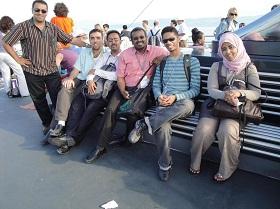Using AI to control energy for indoor agriculture
30 September 2024
Published online 15 July 2010

For an entire week, the tranquil and exotic German island of Lindau was transformed into a beacon of science attracting young researchers from across the world, including several from the Arab world, to rub shoulders with Nobel laureates.
The 60th Lindau Nobel Laureate Meeting, which took place during the last week of June 2010, brought together more than 650 young researchers and 59 Nobel laureates from the fields of physiology or medicine, physics and chemistry.
The meeting is a chance for Nobel laureates to share their experience with the most promising of a new generation of researchers. Only 10 young Arab researchers from six Arab states participated in this year's meeting. Each walked away with their own perception of the gathering.
Asaad Khalid, a researcher in the Medical and Aromatic Plants Research Institute in Sudan's National Center for Research, enjoyed the moral support offered by the laureates. "Frankly, this was the only benefit for me from this meeting. All the lectures given were far from my area of expertise except for one." Khalid felt the lectures generally focused on climate change and sustainable development.
On the final day of the meeting, the visitors went on a boat trip to the island of Mainau. Relaxing on the solar-powered boat, the young researchers got a chance to engage in more casual discussions with the Nobel laureates.
"But I did enjoy spending time with the laureates. That was truly inspirational," added Khalid.
Winning a Nobel Prize is near impossible in an Arab university.
Tahani Al-Beladi, a researcher at the Physics & Astronomy Department in King Saud University, Riyadh, Saudi Arabia, had a different experience. "The lectures were very useful. I enjoyed learning new things outside my area of expertise. This satisfies my curious nature."
The discussions outside the lecture halls were the most worthwhile experience to Al-Beladi. "I was particularly filled with joy to get the chance to talk and discuss issues with the Nobel laureates. They are role models for every single young researcher."
Even though the main lectures were open to journalists reporting on the conference, the discussion sessions were closed, allowing only the young researchers and Nobel winners to enter. According to the organizers, this offers them a chance to talk more openly with the laureates without worrying about journalists reporting.
Saud Bin Annouz, a Yemeni researcher who recently received funding to continue his post-graduate studies in physics at Berlin University, Germany, also considered the meeting to be inspirational, however, he also found it depressing. "After I complete my studies in Germany I will go back to Yemen to teach at Hadhramout University because staying here would be very hard on me and my family. It is a culture very foreign to ours in Yemen and we would find it impossible to adapt and fit in.
"Winning a Nobel Prize is near impossible in an Arab university. We lack the financial and moral potential that is necessary to achieve this level of success."
Rasha Hussein, a young Egyptian researcher working at the University of Bremen in Germany, disagrees. Before the meeting, she believed the Nobel laureates were extraordinary scientists unlike normal researchers. "I felt like they came from a different planet! But after our direct contact with them, I realized they are normal people like us who endured our same problems such as the absence of financial support and the necessary means to conduct research. However, they were patient and through hard work and will they managed to achieve their targets.
"I made up my mind. From now on, I have my eyes set on winning the Nobel Prize."
doi:10.1038/nmiddleeast.2010.176
Stay connected: